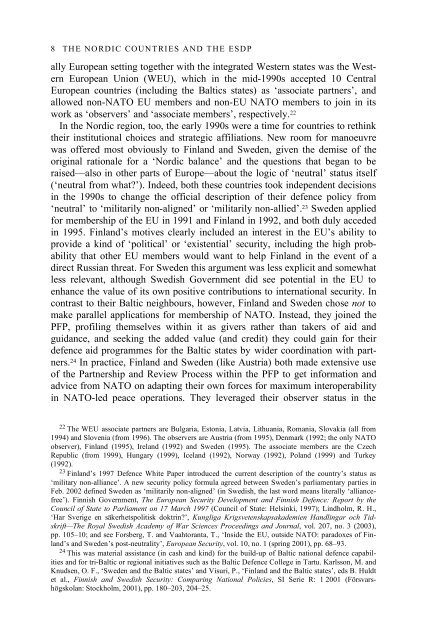The Nordic Countries and the European Security and Defence Policy
The Nordic Countries and the European Security and Defence Policy
The Nordic Countries and the European Security and Defence Policy
- No tags were found...
Create successful ePaper yourself
Turn your PDF publications into a flip-book with our unique Google optimized e-Paper software.
8 THE NORDIC COUNTRIES AND THE ESDPally <strong>European</strong> setting toge<strong>the</strong>r with <strong>the</strong> integrated Western states was <strong>the</strong> Western<strong>European</strong> Union (WEU), which in <strong>the</strong> mid-1990s accepted 10 Central<strong>European</strong> countries (including <strong>the</strong> Baltics states) as ‘associate partners’, <strong>and</strong>allowed non-NATO EU members <strong>and</strong> non-EU NATO members to join in itswork as ‘observers’ <strong>and</strong> ‘associate members’, respectively. 22In <strong>the</strong> <strong>Nordic</strong> region, too, <strong>the</strong> early 1990s were a time for countries to rethink<strong>the</strong>ir institutional choices <strong>and</strong> strategic affiliations. New room for manoeuvrewas offered most obviously to Finl<strong>and</strong> <strong>and</strong> Sweden, given <strong>the</strong> demise of <strong>the</strong>original rationale for a ‘<strong>Nordic</strong> balance’ <strong>and</strong> <strong>the</strong> questions that began to beraised—also in o<strong>the</strong>r parts of Europe—about <strong>the</strong> logic of ‘neutral’ status itself(‘neutral from what?’). Indeed, both <strong>the</strong>se countries took independent decisionsin <strong>the</strong> 1990s to change <strong>the</strong> official description of <strong>the</strong>ir defence policy from‘neutral’ to ‘militarily non-aligned’ or ‘militarily non-allied’. 23 Sweden appliedfor membership of <strong>the</strong> EU in 1991 <strong>and</strong> Finl<strong>and</strong> in 1992, <strong>and</strong> both duly accededin 1995. Finl<strong>and</strong>’s motives clearly included an interest in <strong>the</strong> EU’s ability toprovide a kind of ‘political’ or ‘existential’ security, including <strong>the</strong> high probabilitythat o<strong>the</strong>r EU members would want to help Finl<strong>and</strong> in <strong>the</strong> event of adirect Russian threat. For Sweden this argument was less explicit <strong>and</strong> somewhatless relevant, although Swedish Government did see potential in <strong>the</strong> EU toenhance <strong>the</strong> value of its own positive contributions to international security. Incontrast to <strong>the</strong>ir Baltic neighbours, however, Finl<strong>and</strong> <strong>and</strong> Sweden chose not tomake parallel applications for membership of NATO. Instead, <strong>the</strong>y joined <strong>the</strong>PFP, profiling <strong>the</strong>mselves within it as givers ra<strong>the</strong>r than takers of aid <strong>and</strong>guidance, <strong>and</strong> seeking <strong>the</strong> added value (<strong>and</strong> credit) <strong>the</strong>y could gain for <strong>the</strong>irdefence aid programmes for <strong>the</strong> Baltic states by wider coordination with partners.24 In practice, Finl<strong>and</strong> <strong>and</strong> Sweden (like Austria) both made extensive useof <strong>the</strong> Partnership <strong>and</strong> Review Process within <strong>the</strong> PFP to get information <strong>and</strong>advice from NATO on adapting <strong>the</strong>ir own forces for maximum interoperabilityin NATO-led peace operations. <strong>The</strong>y leveraged <strong>the</strong>ir observer status in <strong>the</strong>22 <strong>The</strong> WEU associate partners are Bulgaria, Estonia, Latvia, Lithuania, Romania, Slovakia (all from1994) <strong>and</strong> Slovenia (from 1996). <strong>The</strong> observers are Austria (from 1995), Denmark (1992; <strong>the</strong> only NATOobserver), Finl<strong>and</strong> (1995), Irel<strong>and</strong> (1992) <strong>and</strong> Sweden (1995). <strong>The</strong> associate members are <strong>the</strong> CzechRepublic (from 1999), Hungary (1999), Icel<strong>and</strong> (1992), Norway (1992), Pol<strong>and</strong> (1999) <strong>and</strong> Turkey(1992).23 Finl<strong>and</strong>’s 1997 <strong>Defence</strong> White Paper introduced <strong>the</strong> current description of <strong>the</strong> country’s status as‘military non-alliance’. A new security policy formula agreed between Sweden’s parliamentary parties inFeb. 2002 defined Sweden as ‘militarily non-aligned’ (in Swedish, <strong>the</strong> last word means literally ‘alliancefree’).Finnish Government, <strong>The</strong> <strong>European</strong> <strong>Security</strong> Development <strong>and</strong> Finnish <strong>Defence</strong>: Report by <strong>the</strong>Council of State to Parliament on 17 March 1997 (Council of State: Helsinki, 1997); Lindholm, R. H.,‘Har Sverige en säkerhetspolitisk doktrin?’, Kungliga Krigsvetenskapsakademien H<strong>and</strong>lingar och Tidskrift—<strong>The</strong>Royal Swedish Academy of War Sciences Proceedings <strong>and</strong> Journal, vol. 207, no. 3 (2003),pp. 105–10; <strong>and</strong> see Forsberg, T. <strong>and</strong> Vaahtoranta, T., ‘Inside <strong>the</strong> EU, outside NATO: paradoxes of Finl<strong>and</strong>’s<strong>and</strong> Sweden’s post-neutrality’, <strong>European</strong> <strong>Security</strong>, vol. 10, no. 1 (spring 2001), pp. 68–93.24 This was material assistance (in cash <strong>and</strong> kind) for <strong>the</strong> build-up of Baltic national defence capabilities<strong>and</strong> for tri-Baltic or regional initiatives such as <strong>the</strong> Baltic <strong>Defence</strong> College in Tartu. Karlsson, M. <strong>and</strong>Knudsen, O. F., ‘Sweden <strong>and</strong> <strong>the</strong> Baltic states’ <strong>and</strong> Visuri, P., ‘Finl<strong>and</strong> <strong>and</strong> <strong>the</strong> Baltic states’, eds B. Huldtet al., Finnish <strong>and</strong> Swedish <strong>Security</strong>: Comparing National Policies, SI Serie R: 1 2001 (Försvarshögskolan:Stockholm, 2001), pp. 180–203, 204–25.
















